A LIFE IN THE DAY OF MACAU
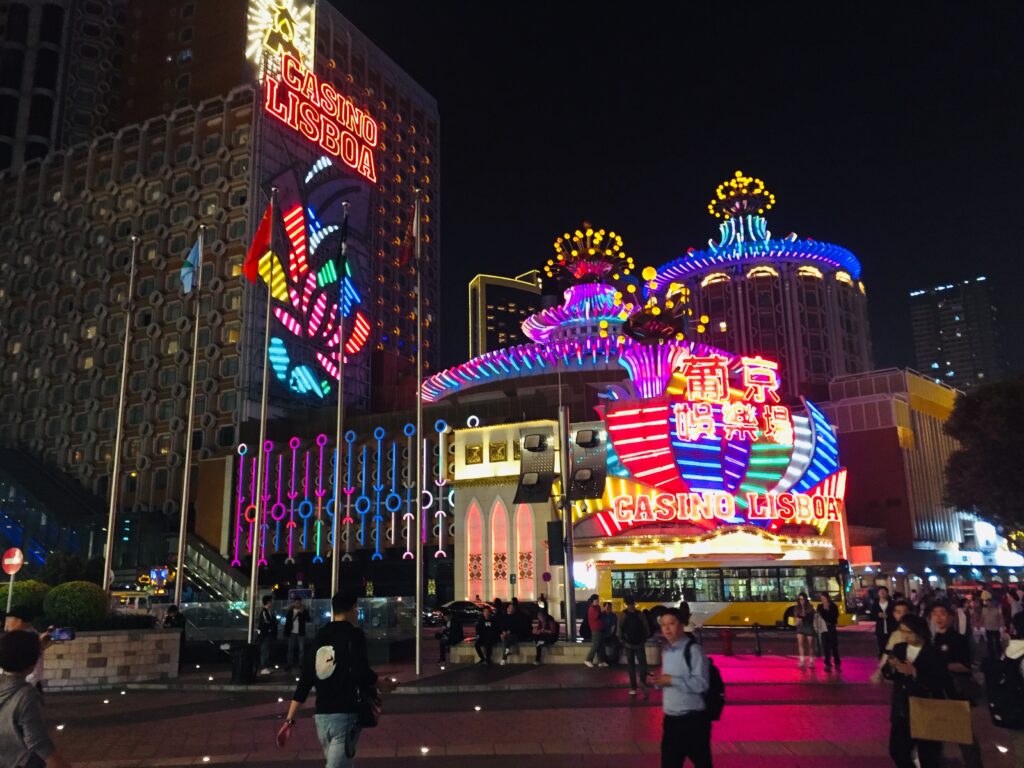
Ask Chat GPT where can you find replicas of London, Venice and Paris situated within a Portuguese metropolis, where the sun never stops shining and the entire population is Chinese, and it will either respond by saying that it cannot answer such a crazy question, or it will direct you to a faraway land that seems too fanciful to be real named Macau. Its a land of casinos and churches, vice and virtue rolled up into a picture postcard peninsula of promise and riches. No one who witnesses its charms will ever be the same again, and even a day on this land will spark a lifetime of experiences and anecdotes. Whatever happens in Macau will most certainly not stay in Macau.
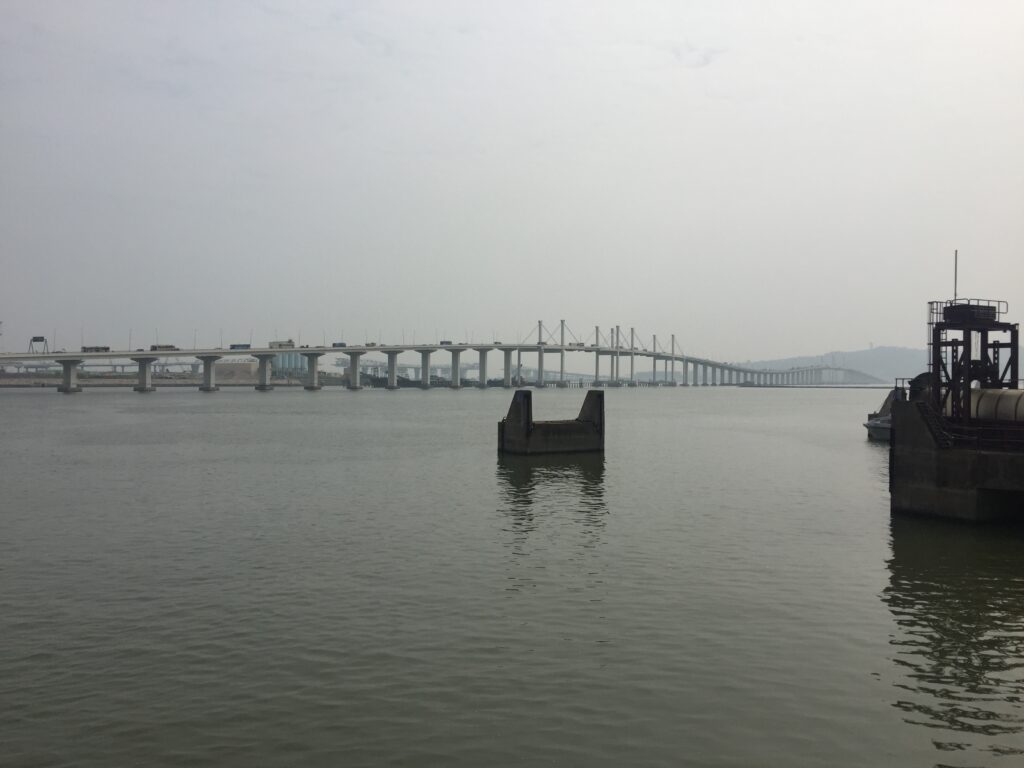
It was a hazy, overcast day in January as the crowded ferry glided along the calm seas at the mouth of the Pearl river. Temperatures hovered around 20 degrees, but cloud cover diminished the heat of the afternoon sun. The boat docked at the port, the passengers disembarked in an orderly fashion, and everyone progressed through immigration without issue. It was just over an hour since I’d left the manic bustling metropolis of Hong Kong, with its crowded streets and its towering skyscrapers, but now I was in a totally different world, where traditional China lived alongside a curious mix of old-world Europe and a glitzy, ritzy pleasure dome of 21st Century vice. This little enclave, a Special Administrative Region of China, is known as East Las Vegas because of its abundance of casinos, but such is the volume of gambling that goes on here it might be more appropriate to refer to Vegas as West Macau. I had a day to explore, and it looked like I was in for a wild ride.
Portuguese explorers arrived in the region in the 16th Century, and established a trading port on the site with the permission of the ruling Ming Dynasty. The Portuguese leased the land from China, and over the following centuries it became a major trading centre for China, India, Japan and Europe. The Jesuits also moved in and contributed significantly to the region’s cultural and educational development, building a host of churches that still stand today. Macau’s modern incarnation as a gambling destination began after the second world war, and the popularity of this vice has exploded since Portugal returned the region to China in 1999. Today, many of China’s prosperous middle classes travel en mass to Macau to wager their earnings on red or black, and given the size and scale of the resorts it’s obvious that gambling is a very lucrative business. But even in a communist country, the house still always wins.
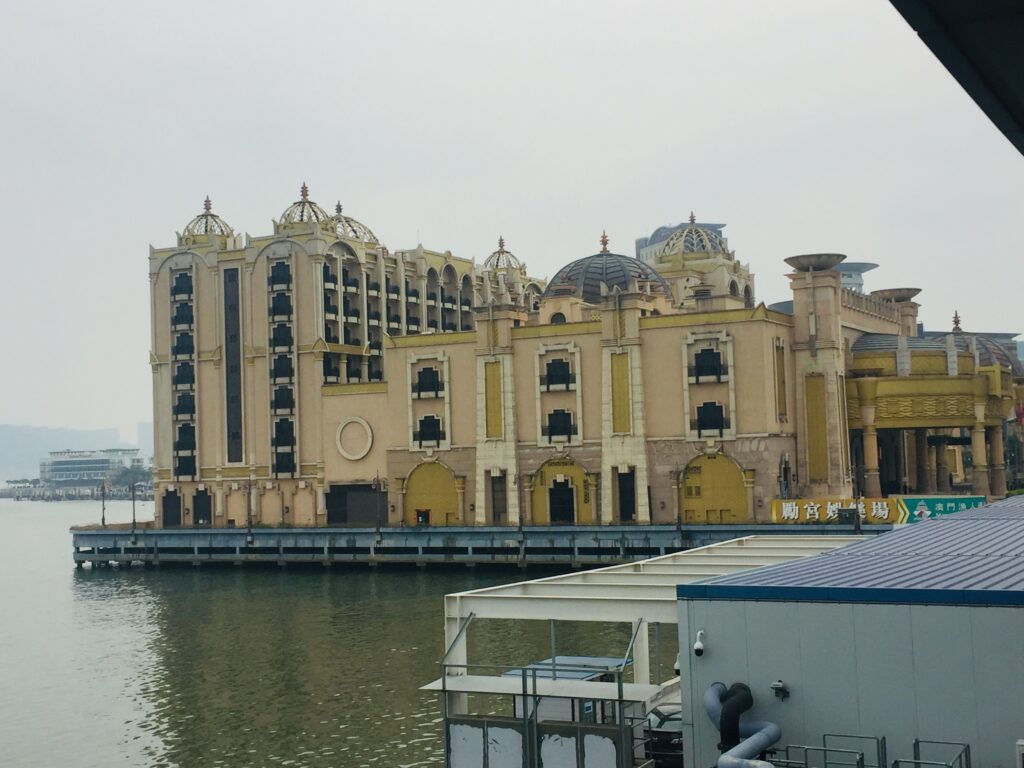
I left the main ferry terminal and decided to walk to my hotel on the far side of the peninsula, a stretch of the leg that would take about 45 minutes to complete. The first sight I encountered was a gaudy looking casino called The Sands, named after the famous Vegas haunt where Frank, Dean, Sammy and the rest of the Rat Pack held court in the halcyon days of the 1950s and 60s. This kitchy gold hotel, perched on the waterfront, emitted a seediness that reminded me of disreputable establishments in old Humphrey Bogart movies from the 1940s. I was intrigued. Progressing further on, I walked along streets where the signs were in both Chinese and Portuguese, and the businesses ranged from modest local mom and pop outlets, to western fast food chains, to cheap honky tonk casinos where the low rollers gambled away their nickels and dimes, but where the high rollers wouldn’t be seen dead.
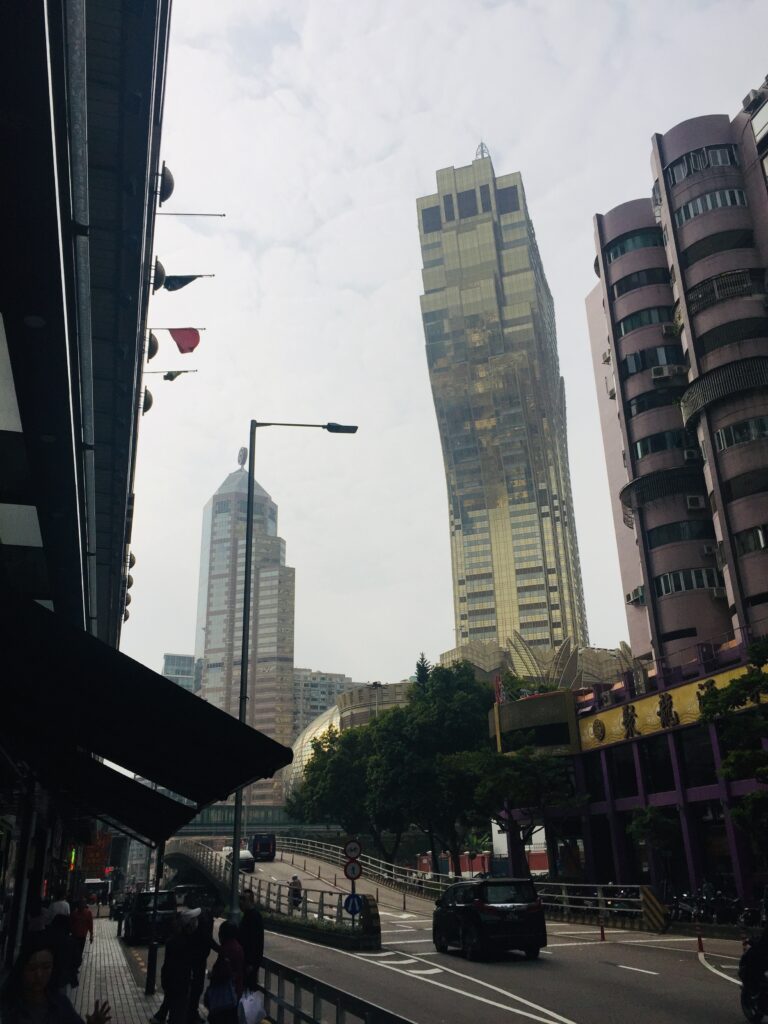
I passed through one of the main casino districts a little later, where the centrepiece is the Grand Lisboa, one of the Macau’s most iconic hotels, built in the shape of a burning flame setting the sky ablaze. I planned to revisit this spot at night when the neon lights would really bring this town to life. Moving just a few blocks on, I entered into a very different world of small, winding, shadowy streets, where a local populace went about their daily business as if gambling was the furtherest thing from their minds. Motor repair outfits, garment altering shops, grocers and other meat and potato stores (plus a plethora of 711s) were the main businesses in the old town of Macau. This area looked and felt like real China, and the mainland was in fact just a few hundred metres away across the river. As I explored further, the texture of the town changed from Chinese to Portuguese, as the influence of settlers from Europe from centuries ago made its presence known. I hadn’t even reached my hotel and yet I felt like I’d been to three continents in the space of an hour.
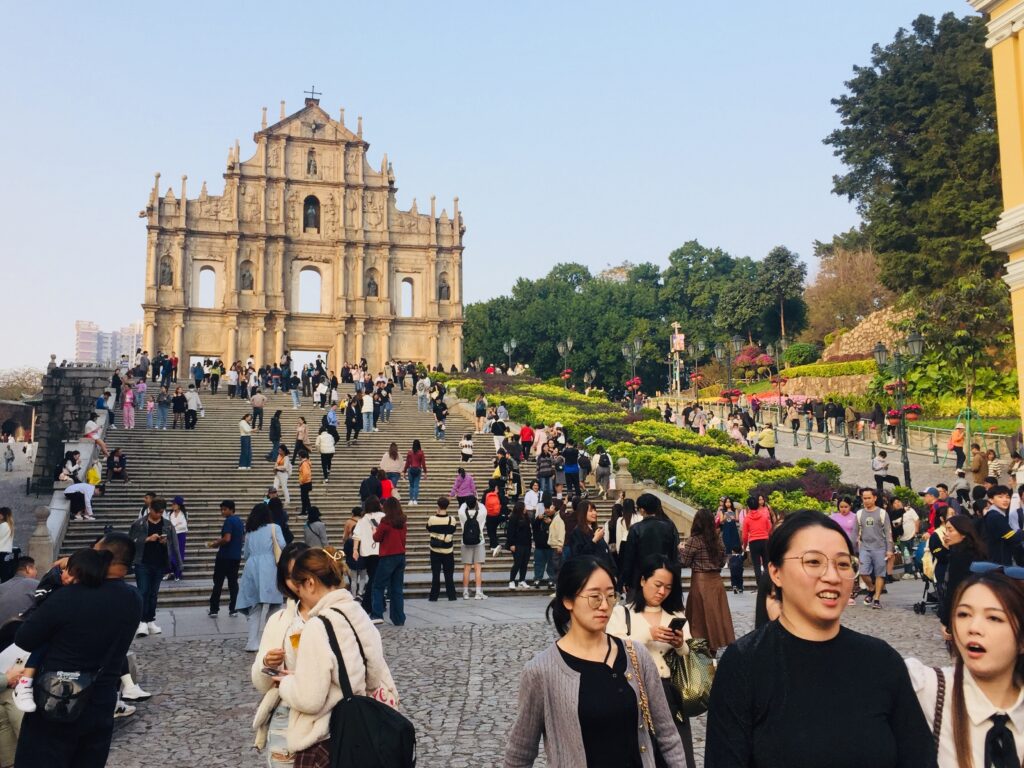
The old town of Macau centres on Senando Square, a traditional Portuguese styled square surrounded by neoclassical buildings, and somewhere that would not look out of place on the Iberian Peninsula or in Latin America. Only the incongruous dragon draped along the side of a building, or the Chinese lanterns suspended across one of the side streets served as a reminder that I was in Asia. Colonial styled churches, with white or yellow facades, can be found scattered throughout the old town. The biggest attraction is the imposing edifice of the ruins of St Paul’s. This 16th century cathedral, built by Jesuit missionaries, was once the largest church in Asia, but it was destroyed by fire in the 1835 and only it’s imposing renaissance exterior stands today. Over a million people visit this site every year, and it is one of the iconic symbols of this town. On a hill nearby is the Macau Fortress, also built by the Jesuits in the 16th Century, which was constructed to defend the Portuguese colony from their Dutch and other European rivals in the region. The fortress offers sweeping vistas of old town Macau, the neon spires of its glamours downtown gambling dens, and the apartment blocks of real China across the river.
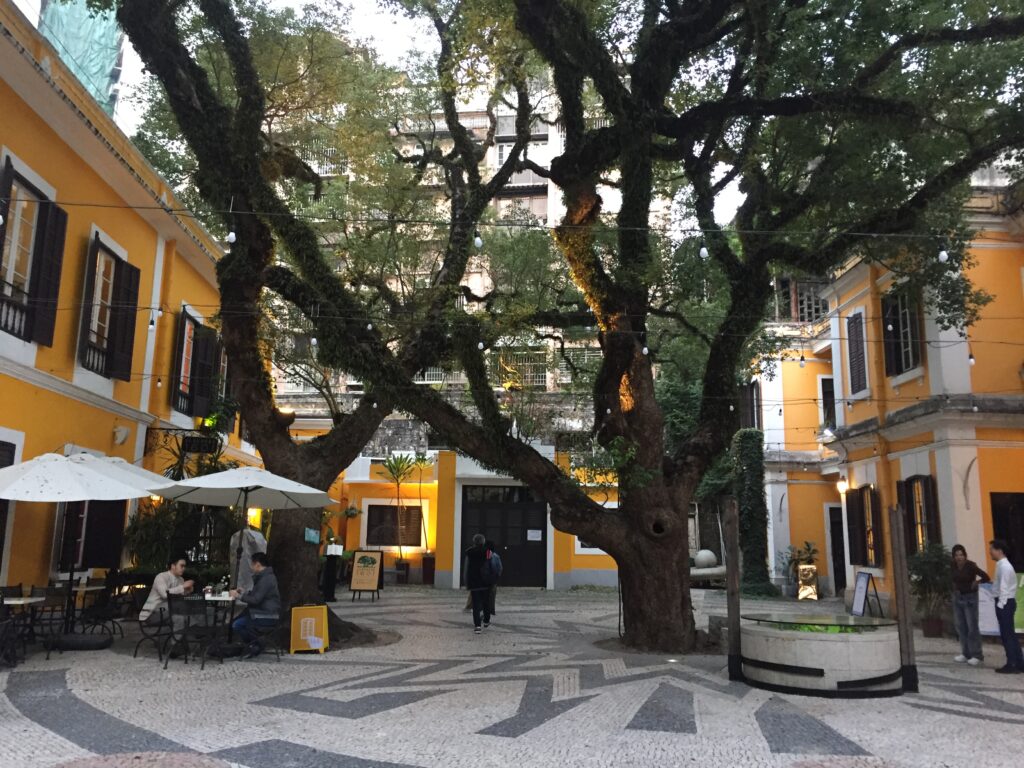
I wandered through the surrounding narrow streets and laid back squares, which were lined with colonial styled buildings painted in pastel shades of red, green and blue, and paid a visit to an art gallery which displayed a mixture of paintings with European and Asian subjects. I’d visited Chinatowns in western cities, where the charms and customs of the east had been authentically transplanted by immigrants, but this was Eurotown in China, a perfectly preserved Iberian styled municipality that seemed like it was just a short walk from the Mediterranean, which was in reality about 10,000 kilometres away.
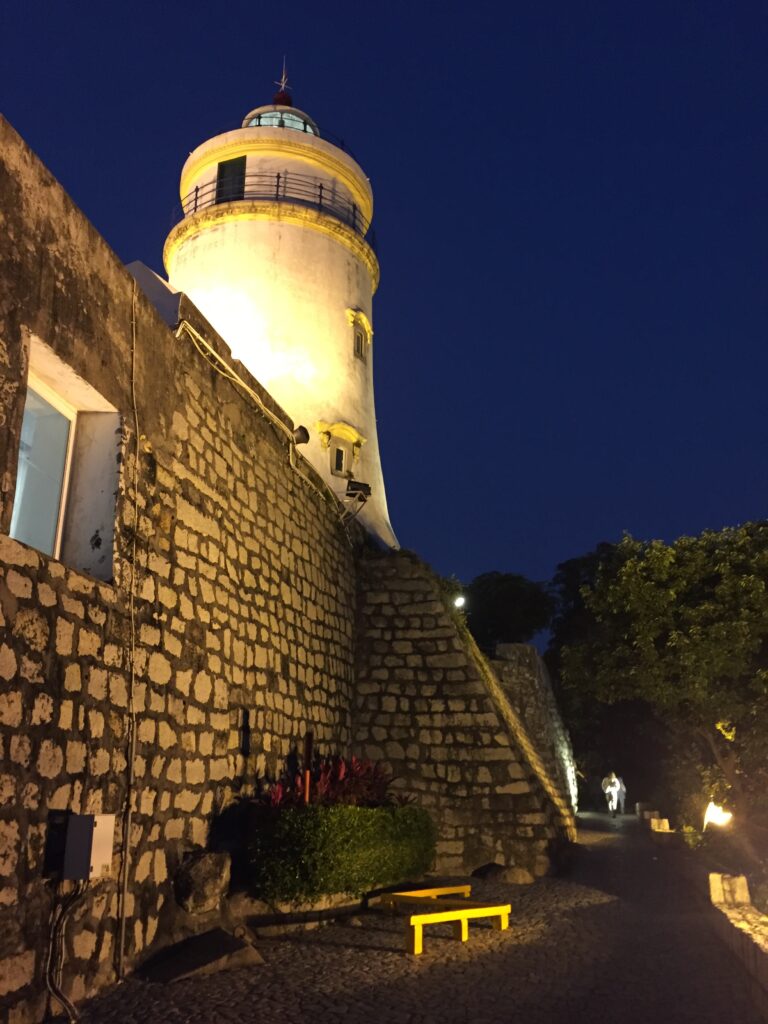
Having explored the peaceful wooded pathways around the nearby Guia Hill, where joggers and walkers exercise in the shadow of a fortress and a 19th century lighthouse, it was time to head downtown to the roll dice and play black jack, or at least watch people who did. Macau, and not Las Vegas, is in fact the actual gambling capital of the world, with some estimates suggesting twice as much is wagered in the Chinese Special Administrative Region than in the Nevada Desert. There are about 40 casinos in the area, with some of the more “modest” ones located on the tip of the Macau peninsula, and the really, really ostentatious ones on Cotai Island nearby.
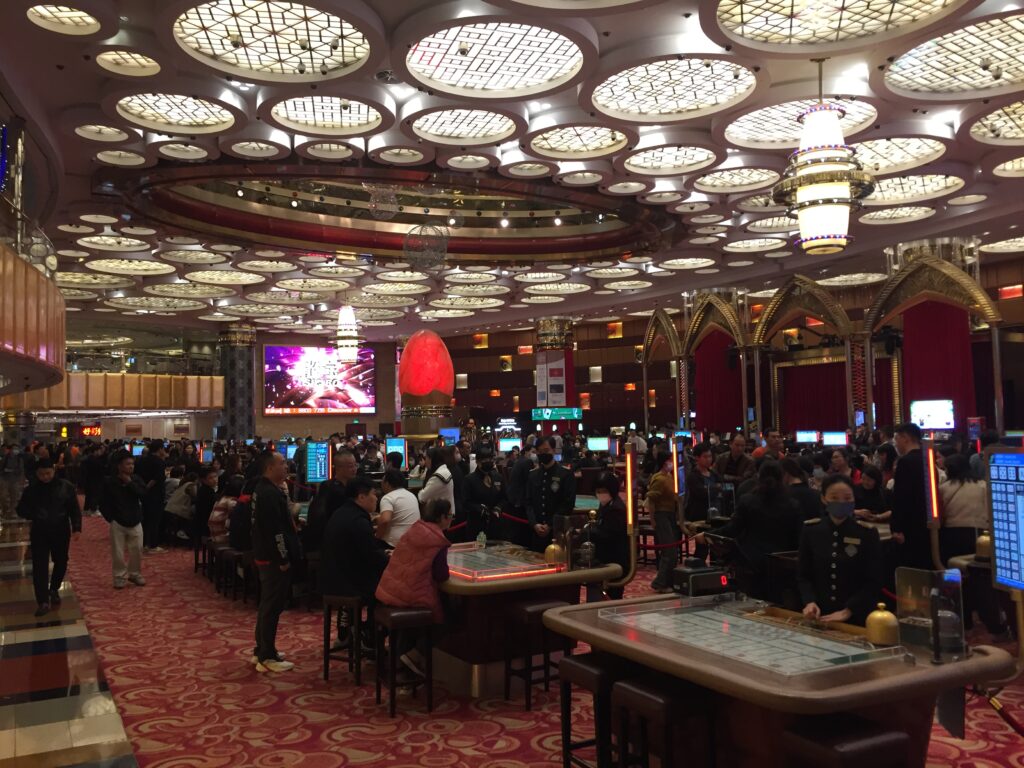
Not being of a gambling disposition, or perhaps recognising that I could easily develop such a habit, I decided to explore some of the casinos purely for anthropological reasons. The first one I entered had gaming rooms spread out across several floors, where dozens of bored and frustrated Chinese people stared at screens featuring computerised card games. None of them looked like they were making any money. From that joint I ventured deeper into the neon jungle nearby, which contained the Grand Lisboa, a hotel that lit up the sky at night light a bright welcoming beacon, enticing residents from mainland China to come across and improve their lot in life with one lucky spin on a roulette table. Inside, crystal chandeliers oozed decadence from the ceiling, and floors of rich, ruby red carpets paved the way to the main gambling arena that was the size of a football field, and just as crowded and noisy as slot machines pinged, roulette tables spun, revellers placed bets, then celebrated wins or more likely mourned their loses.
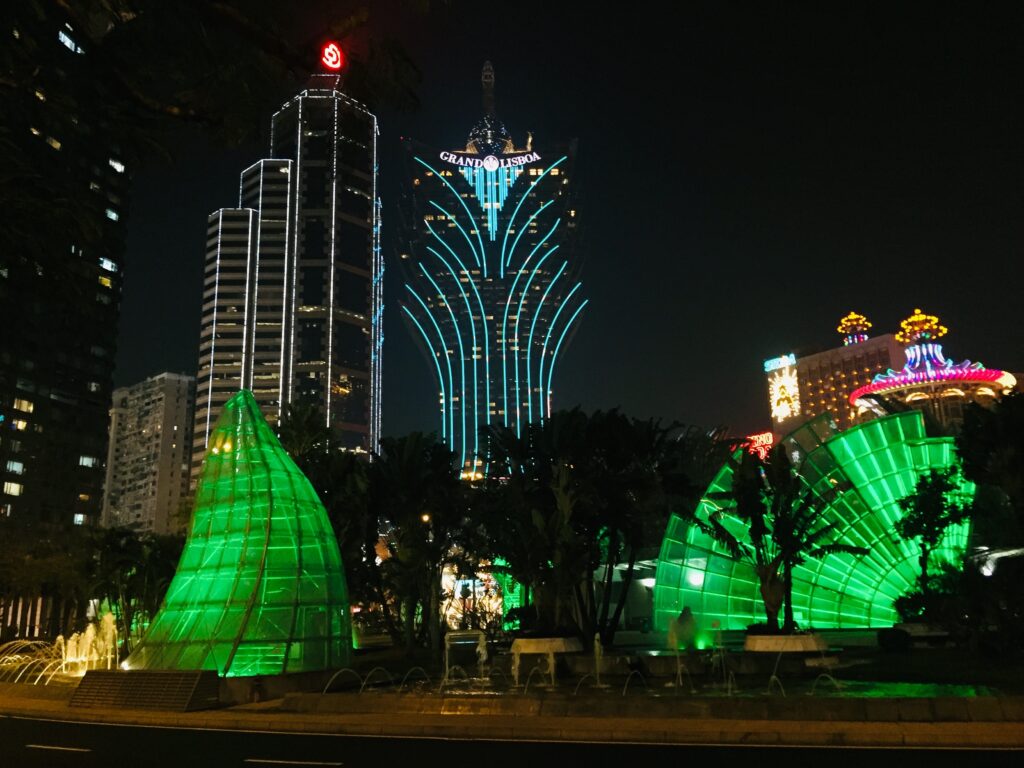
The MGM Grand, the Wynn and the Grand Emperor were located nearby. Their exteriors were so ostentatiously adorned they could be seen from space, and their interiors featured endless opportunities for people to lose or spend money. The hotels also contained shopping malls with high end luxury products and Michelin star restaurants to tempt lucky rollers to part with their winnings. The house was going to keep the pundits’ cash one way or the other. In the plazas outside were beguiling assortments of crystal palaces, royal carriages, neon butterflies and grand fountains of the kind that George Clooney and Brad Pitt might look upon with satisfaction having beaten the house at its own game. I didn’t see anyone like that here. But I don’t suspect many people came to Macau expecting to make a fortune. Macau was just a mirage in the South China Sea, and people came for the opportunity to see the illusion of wealth up close, only to see it disappear into a burst of neon vapour with one erroneous roll of the dice.
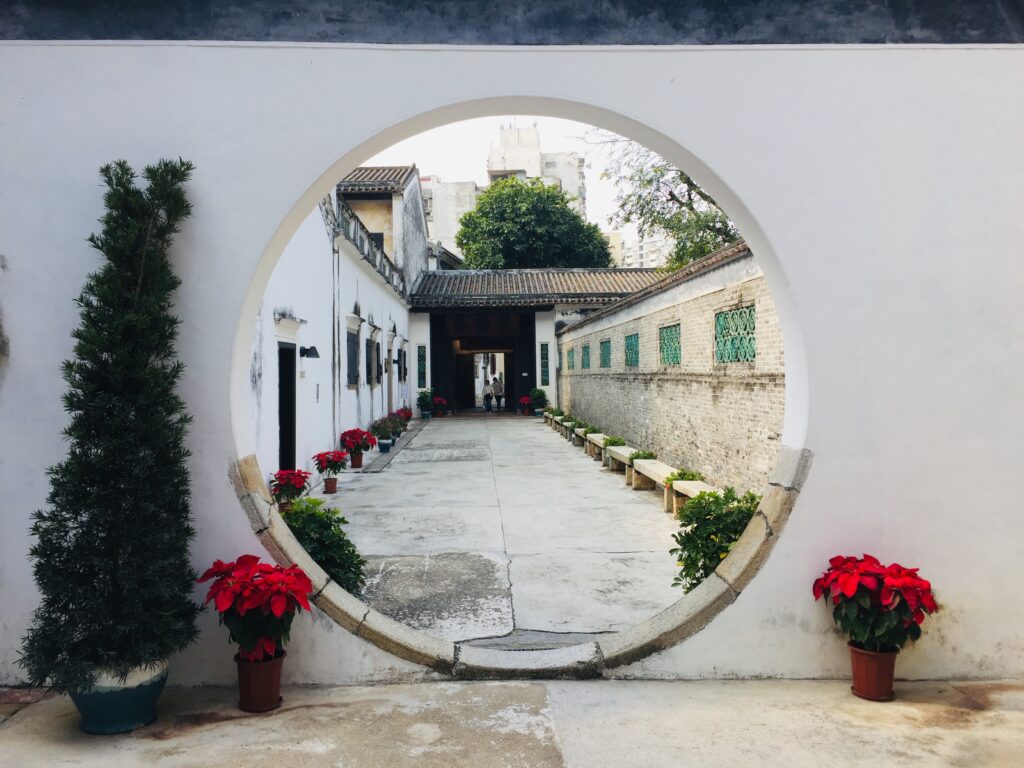
Witnessing the electronic kaleidoscope of colours on display in casino town was the equivalent of un urban LSD trip, so the following day I wanted to detox by savouring more of Macau’s traditional locations and Chinese culture. I had breakfast in a food court near my hotel, where small stalls served up an interesting array of local dishes. Given that my knowledge of the language was none, I went to one stall, pointed at a product and hoped for the best. I was served a bowl of rice porridge with meat, and a rice dumpling. It was good. Later I ventured to the Church of San Lorenzo, an attractive European church nestled into the narrow streets of a more Chinese section of town, and from there to nearby Mandarin’s House, a nicely preserved 19th century residence of a prominent Chinese literary figure, Zheng Guanying. I passed a pleasant half an hour or so wandering through the interconnecting rooms, courtyards and gardens of this house, which was laid out according to the principles of Feng Shui.
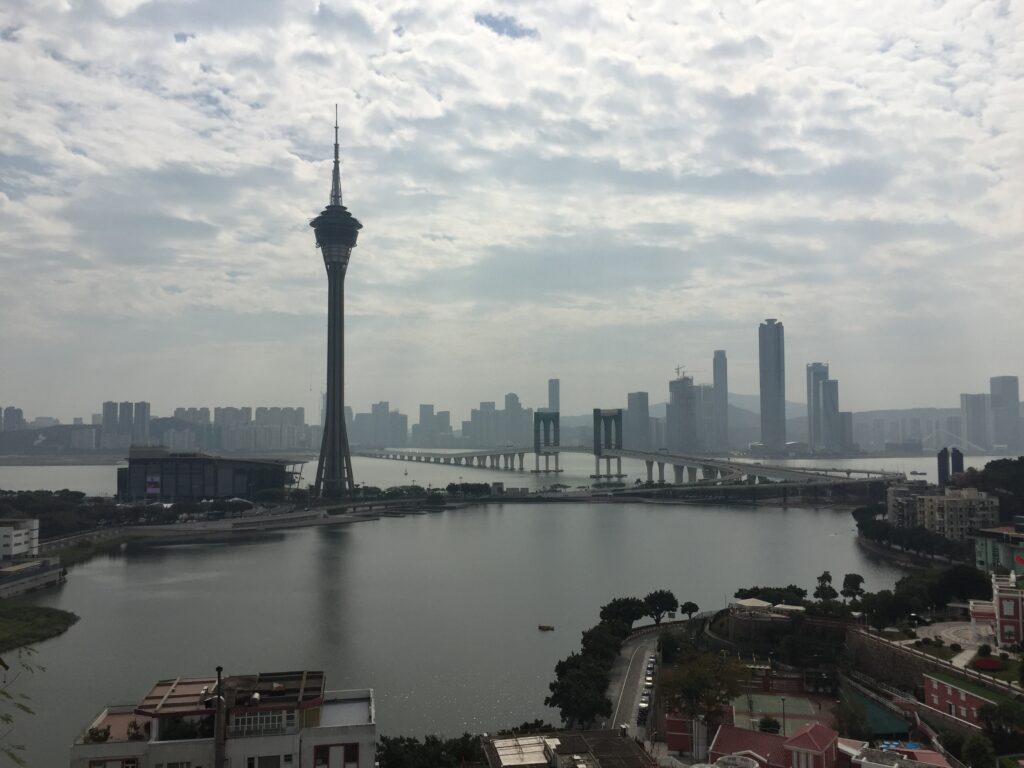
Further down the road was the A-Ma Temple, an intricate hillside Taoist temple comprising pavilions, halls, courtyards and alters connected by winding paths and stone staircases. A pungent aroma of burning incense pervaded this sacred site dedicated to the goddess Mazu, who protects seafarers and fishermen. Around the corner and up the hill from the temple stood the Chapel of Our Lady of Penha, a Catholic church which was perfectly positioned to enjoy impressive panoramas of Macau bay, the 338 metre Macau Tower and the casino strip beyond. The church lay at the end of a long avenue of opulent modern houses, most of which seemed to be eerily unoccupied for some reason. Perhaps their owners had bet those properties on the wrong colour.
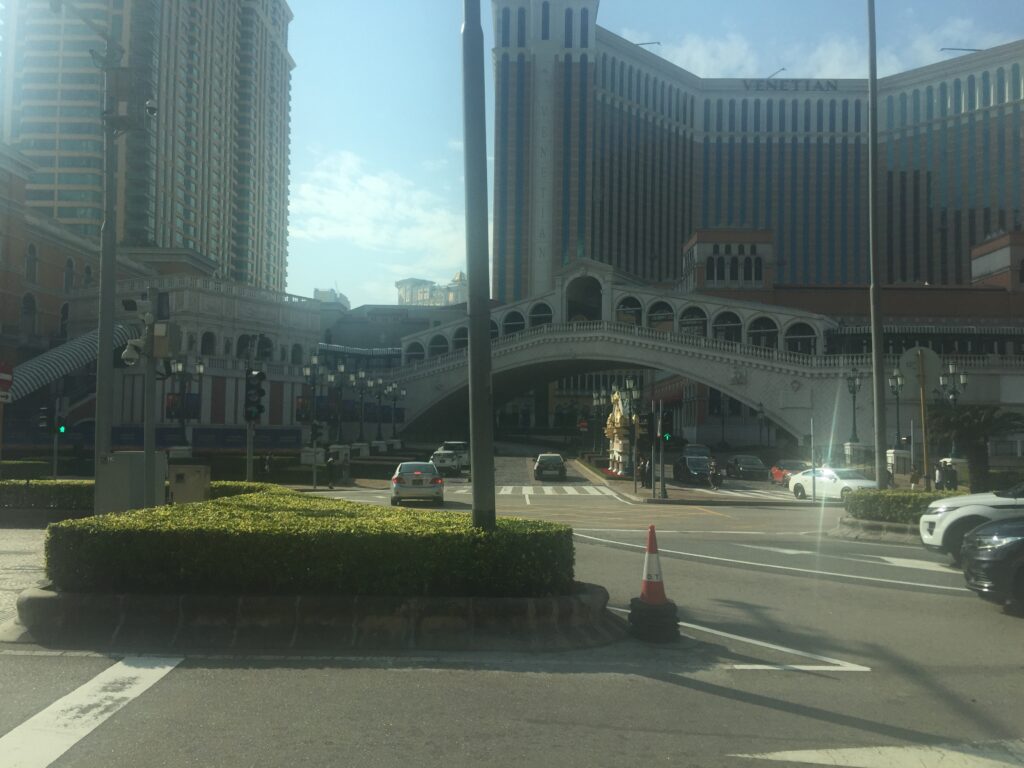
Having enjoyed another mysterious dish for lunch in the same food court I’d had breakfast, I decided to spend my remaining few hours in Macau exploring the village of Coloane, a traditional Portuguese village at the southern tip of Macau. Coloane is located on an island south of the main Macau peninsula, and is accessible via the district of Cotai, which is built on reclaimed land. My bus had to traverse the Cotai Strip, which contained casinos that were so excessive, outlandish and over the top it made the ones I’d seen the night before look like a high street betting shop. I was overawed by the Venetian Macau Hotel, a giant replica of the city, complete with fake canals and reproductions of the Rialto Bridge, Plaza San Marco and the Doge’s Palace. At 1.2 million square metres it’s one of the largest buildings in the world. As I gazed in amazement at the sight of this city within a city I almost missed the Old London Hotel on the other side of the street, which contained a carbon copy of Big Ben and the Palace of Westminster, complete with a line of palm trees outside. Then just beyond, on the other side next to Venice was a mini Eiffel Tower. Further down the strip was the Hollywood themed Studio City, while a few blocks away, looking like it had been formed by a volcanic eruption of fake gold stood Galaxy, a casino that was so loud, garish and vulgar that even Donald Trump would have looked at it, shaken his head and grunted, “Too much.”
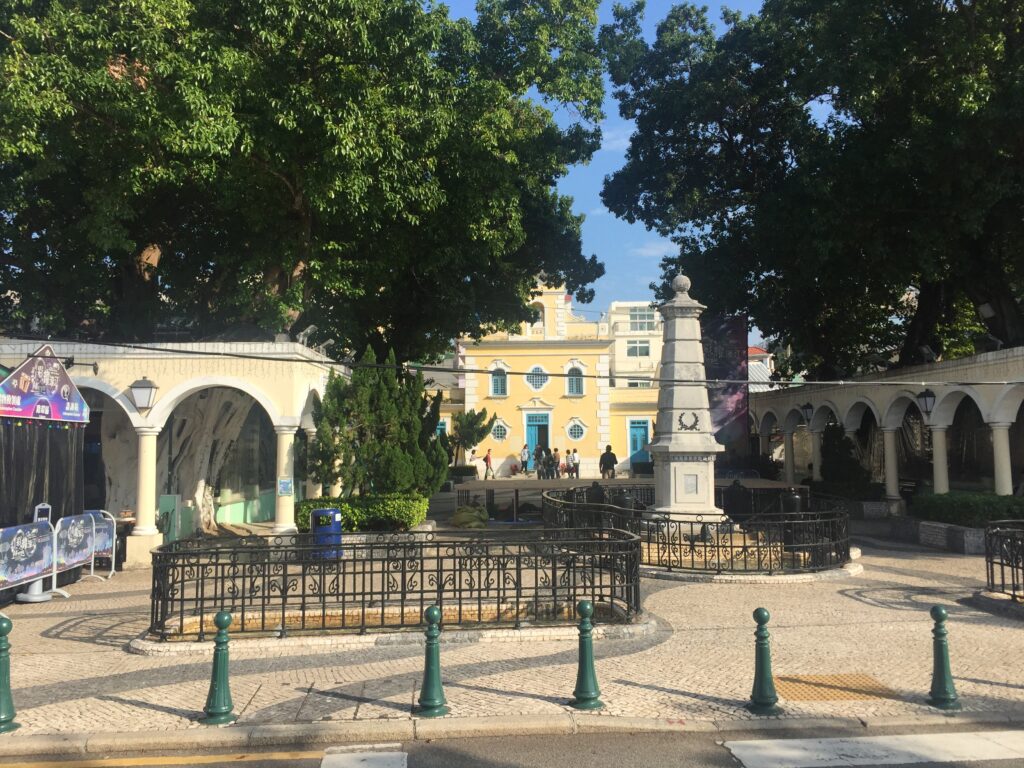
And then, a short ride away yet in a different world, stood Coloane, a resplendent, laid back old world village on the banks of a river looking across at modern, menacing China on the other side. It was a quiet, lazy, sunny Saturday afternoon, and I enjoyed a gentle stroll along the banks of the river under the canopy of trees, and wandered wistfully through the narrow streets of the village, its squares and churches. On my walk I came across an abandoned shipyard, where weeds and brambles now occupy the construction yards once taken up by the building of boats. A thriving industry had once stood on these parts, but competition and modernisation saw the last of these close in 2005. This tiny little corner of colonialism and deindustrialisation was another example of the enchanting and multifaceted features of Macau, a statelet of little more 30 square kilometres in size, yet more densely packed with cultural diversity, history, curiosity, vice and virtue than many nations can boast.
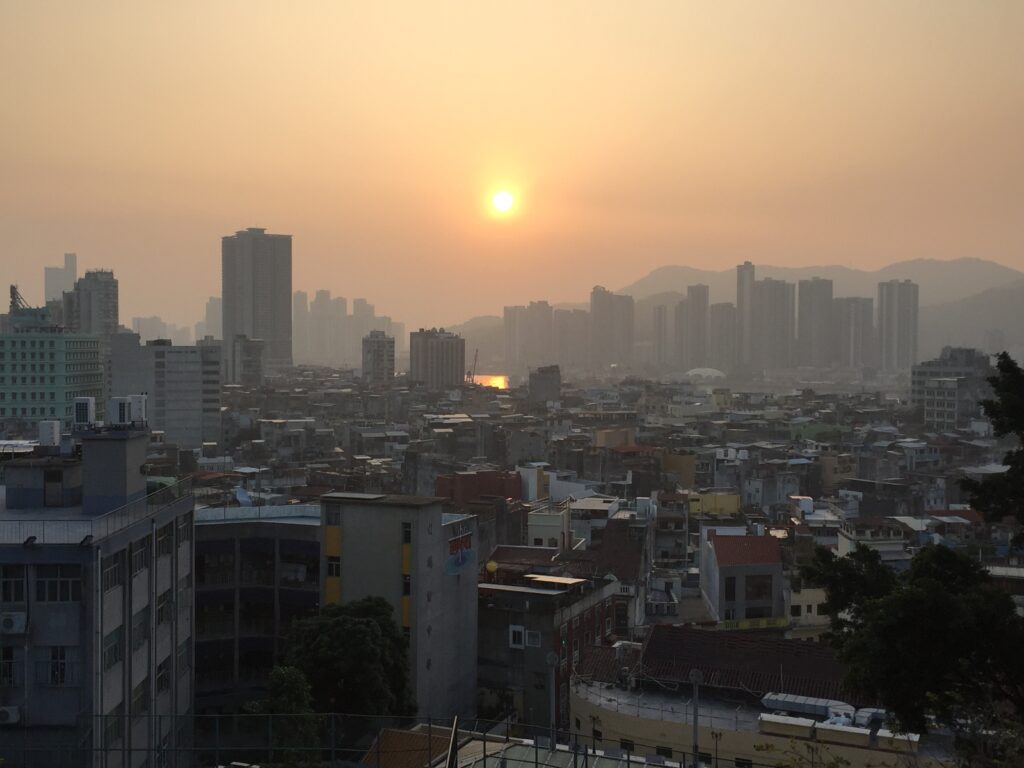
It was little more than a day since I stepped off the ferry into this crazy land, yet wherever I would go from here nowhere would be as wild and varied as Macau. Dazzling, disorienting and dazing, it was a place that seemed more dreamlike than real, a shining fantasy land of the kind that could only be created by dreamers and populated by those trying to escape something more mundane. A bite sized trip was just enough to satisfy my curiosity. Any longer and the fake gold might lose its lustre and the neon may burn itself out. Like an exciting and vivid dream, Macau is ethereal and fleeting, its essence can never be fully grasped and words will not do justice to the experience, but being immersed in it is transcendent and transformative, and its aftereffects leave a warm and colourful glow long after we awake and return to reality.
Fascinating read John. ( we met on the Camino in 2013, and you later gave us a walking tour of Cork and a very fine supper as well. 🙂 )
Thanks, Gary. Good to hear from you. I hope you’re all well in Candad.